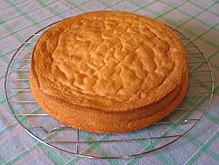biscuit

Biskuit (from French biscuit from Latin to coctus [panis] , "twice baked [bread]") is a light long-life baked product made from biscuit mass , a mixture of egg whites , egg yolks, sugar and flour. A variation on the sponge fingers (even children biscuit or Austrian Biskotte ).
definition
According to the “Guiding Principles for Fine Baked Goods ”, biscuits for commercial production must have a total content of at least 66.7% based on the weight of cereal products and / or starches. Egg substitutes are not used. No fat is added to the mass. Egg biscuit and other prominent quality designations require twice the egg content, based on the proportion of cereal products and / or starches.
The most important leavening agent in biscuits is the air that has been stirred into the eggs. This makes the mass really loose and voluminous. The flour should only be folded in briefly so that the air does not escape from the mixture. In addition, the mass must be placed in the preheated oven immediately after preparation, otherwise it will collapse.
history
Until the 17th century biscuit referred to ship rusks , a bread that was cut into slices to preserve it and baked a second time until it was dry and crumbly. The term rusk is used for this.
The transition from hard biscuits to loose baked goods did not take place seamlessly: In the 17th century, the dough mass began to be refined with eggs , sugar , nuts , wine and rose water . It was not until a hundred years later that the idea of separating the eggs and whipping the egg white and yolk separately from each other until foamy (“two-vessel process”), then mixing the egg whites under the foamy egg yolk and then folding in the sifted flour.
In Commonwealth English, the word biscuit has retained its original meaning as "hard-baked biscuit" (see cookies ); the German biscuit is translated as sponge cake . In the USA biscuit has developed a different meaning and today describes a soft, unsweetened baked good without yeast.

